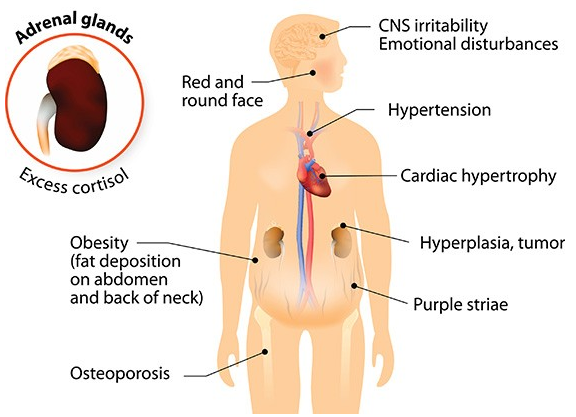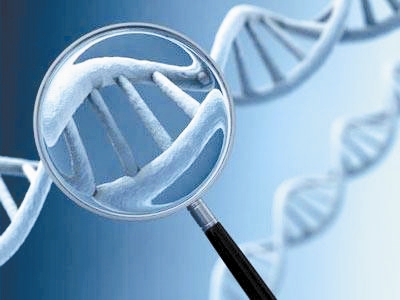(单词翻译:单击)
5.Cushing's Syndrome
5.库兴氏综合征
Sometimes your excess poundage really is due to a medical condition. One of the top culprits is Cushing's syndrome. The rare disease was first described in 1932 by Dr. Harvey Cushing, an American neurosurgeon who helped pioneer brain surgery.
肥胖有时候可能是由生理疾病导致的。罪魁祸首之一就是库兴氏综合征。1932年,哈维•库兴博士第一次阐述了这种罕见的疾病。这位美国神经外科医生对于脑部手术的发展也有贡献。

The syndrome named after Cushing is a complex hormonal condition where the body is flooded with far too much cortisol, the body's main stress hormone. This may occur because of a disorder (for instance a tumor in the pituitary gland), or else you've been taking a lot of steroid-based medications (like the ones prescribed for asthma). In normal amounts, cortisol, produced by the adrenal glands, works to regulate your glucose levels and suppress the immune system. But get too much coursing through your system, and you may end up with thin skin, bruises, high blood pressure, osteoporosis, diabetes, weakness, a puffy face, fat on your neck and shoulders and, yes, weight gain. Indeed, accelerated weight gain is the main characteristic of Cushing's syndrome. If untreated, Cushing's syndrome can lead to death. However, there are several remedies available, from slowly reducing the amount of corticosteroids taken to surgery (in the case of a tumor).
这种以库兴命名的综合征是一种激素紊乱的复杂病症,发病时病人身体会分泌出大量的皮质醇。这种病症可能是由于身体机能紊乱引起的(例如脑下垂体肿瘤),当然也可能是其他原因,例如服用大量的类固醇药物(例如医生为哮喘患者开具的一些处方药物)。正常情况下,皮质醇是由肾上腺分泌,调节控制人体血糖水平以及抑制免疫系统的激素。但是如果皮质醇被大量分泌,贯穿于身体内,其结果可能导致你的皮肤变薄,极易造成瘀伤,引起高血压、骨质疏松、糖尿病、身体虚弱、脸肿、肩膀和脖子肿大,以及肥胖等身体问题。的确,体重突然增加是库兴综合征的主要病征。如果不及时治疗,库兴氏综合征甚至会导致死亡。然而,目前仍有一些可以补救的治疗方法,例如慢慢减少体内的皮质醇或采取手术治疗(有肿瘤的情况下)。
4.Polycystic Ovary Syndrome
4.多囊卵巢综合征

Another medical condition that could be behind an unexplained weight gain is polycystic ovary syndrome, or PCOS. A hormonal disorder that affects women, PCOS is relatively common among females in their child-bearing years, striking between 1 in 10 and 1 in 20 women in the U.S. alone.
不明原因的体重增长背后很可能是另一种医学病况——多囊卵巢综合征,简称PCOS。PCOS是育龄妇女较常见的内分泌症候群,单单在美国就有5%-10%的女性深受其害。
The disease causes women to develop many small cysts on their ovaries. The cysts, in turn, wreak havoc with their hormones, causing an increase in the male hormone androgen. That hormonal imbalance results in acne, a messed-up menstrual cycle and excess body hair. It also causes women to become resistant to insulin, which regulates blood sugar, and thus may result in them getting fatter. Unfortunately, these extra pounds tend to pile on in the belly area, leaving those affected more susceptible to heart issues. PCOS is the most common cause of female infertility. The condition may be genetic, as women with PCOS are more likely to have a mother and sister with PCOS, too. So if you're a woman whose weight has surged and some of your relatives have PCOS, get checked for it yourself.
这种疾病导致女性的卵巢上附着许多小的囊肿。这些囊肿进而造成了荷尔蒙的严重紊乱,使女性体内男性激素增加。荷尔蒙失衡的结果就是出现痤疮、月经异常和体毛过多。它也造成女性对胰岛素产生抗体,胰岛素具有调节血糖的作用,因此造成女性越来越胖。更糟的是,赘肉多集中在腹部,这让女性更容易有心脏问题。PCOS是女性不孕不育最常见的原因。这样的病症很有可能是遗传造成的,通常一位女性患有多卵巢囊肿,她的妈妈和姐姐患同样疾病的可能性非常大。如果一位女性的体重突然激增,并且亲戚之中有人患有PCOS,那么最好去做一次健康检查。
3.Lack of Sleep
3.缺乏睡眠

Several studies show some pretty strong connections between lack of sleep and weight gain. One such study, the Mayo Clinic reports, showed that women who got less than six hours of sleep (or more than nine) were more likely to pack on a whopping 11 pounds (5 kilograms) than females nodding off for seven hours nightly. Another study on the subject found men who lacked adequate Z's took in more calories each day and preferred high-calorie foods.
一些研究已经证明缺少睡眠和体重增加之间有着密切的联系。一份来自梅奥诊所的研究表明,睡眠时间少于六个小时(或超过九个小时)的女性比每天睡七个小时的女性要重11磅(约5千克)。关于这一主题的另一项研究发现缺乏足够睡眠的男性每天会摄入更多的卡路里,他们也更偏爱高热量食品。
So what's sleep got to do with it? One somewhat obvious connection is the longer you're awake, the more time you have to get hungry and eat. Some posit that if you're tired from a lack of sleep, you're less likely to be active and burn calories. Others say the amount of sleep you get each night is tied to the hormones regulating hunger; if you mess them up, your appetite becomes heightened. The easy answer is to simply get a good night's sleep — seven or eight hours — every night. And why not? It sure feels great!
所以睡眠与肥胖到底有什么关系?一个比较明显的联系是:你清醒的时间越长,你就饿得越快,吃东西的次数也越多。有些人认为如果你因为睡眠不足而疲劳,你可能不太愿意活动,进而就不能燃烧卡路里;也有些人认为每晚的睡眠时间和调节饥饿的激素相关:如果你的激素变化了,你的食欲就会增强。最简单的解决办法就是每天好好睡七到八个小时。为什么不呢?这感觉一定非常好。快试试吧~
2.Stress
2.压力

At first glance, you might think just the opposite: Stress will cause you to lose weight. You might have a friend who was stressed from a pending divorce and dropped 20 pounds (9 kilograms), or a sibling anxious about a job loss who suddenly lost his appetite and became too thin. But stress is actually the reason behind a lot of people's weight gains.
乍看来,你可能恰好想到相反的一面:压力能让你减肥。你可能会有这样一个朋友,因为即将离婚而感到压力巨大,因而体重减轻了20磅(约9千克),也可能会有家人为丢了工作而焦虑不堪,因而突然没了胃口以致暴瘦。然而,压力实际上正是造成很多人体重增加的真正原因。
First, adrenaline floods our bodies when we're anxious and stressed out, preparing us for battle (adrenaline is known as the "fight-or-flight" hormone). That rush of adrenaline is followed by a cascade of cortisol, known as the "stress hormone." Cortisol tells our bodies to eat, because in early human history, that extra energy from food was necessary for activities like running and physically fighting. Nowadays, our stress might come from not having enough money to pay bills rather than facing a wild animal, yet our bodies are still programmed to store fat when we're anxious. Cortisol is also the culprit behind emotional eating, that mindless shoveling of food down when we're stressed, and behind our craving for "comfort foods" like ice cream and chips when we're feeling low. As for those people who lose weight from stress, it's likely that they've lost interest in eating or are fidgeting a lot from anxiety, which burns calories.
首先,当我们焦虑或者有压力时,肾上腺素会在我们的体内流动,让我们为“打仗”做好准备(肾上腺素有时被称为“要么战斗,要么逃跑”的荷尔蒙)。涌动着的肾上腺素被大量皮质醇跟随着,皮质醇也被称为“压力荷尔蒙”。皮质醇告知我们,身体要吃东西了,因为在人类早期的历史中,食物中额外摄取的能量对逃跑或者体力战斗这类活动是很有必要的。今天,我们的压力可能来自担心付不起账单,而不是害怕野兽,但是在我们焦虑时,身体还是会运作起来储存脂肪。皮质醇也是吃东西情绪化的始作俑者,我们压力大时,会没心没肺地大口吃东西;在情绪低落时,它也会驱动我们渴望吃到冰激凌和薯条这类“安慰性食物”。至于那些因为压力而体重减轻的人,很可能是他们已经厌食,或者由于焦虑而坐立不安,因此消耗了热量。
1.Genes
1.基因

Many an overweight person has claimed that the extra poundage is all due to their genes. There might be something to such an assertion. Researchers studying mice discovered a genetic mutation in the MRAP2 gene that didn't allow them to burn off calories from fat; this same genetic mutation was found in obese humans. Initially, the mice's genetic mutation caused them to eat less than the norm. However, despite the reduced calories, the mice gained about twice the poundage of normal mice. Eventually the mice's appetites returned, and they ate a typical diet — yet still gained more weight than mice without that mutation. Why? The bodies of the mice with the genetic mutation were storing fat, not burning it for fuel. In a study of 500 obese people, scientists found a similar situation with the human version of the MRAP2 gene. Keep in mind, though, that scientists have identified only about eight genetic mutations that cause obesity in humans. And these mutations are considered to cause less than 5 percent of all of the cases of obesity in society.
很多肥胖之人都把他们多余的赘肉归因于他们的基因。这一断言也许不无道理。研究老鼠的研究员在MRAP2基因中发现了一种基因变体,这种变体不允许老鼠消耗脂肪中的热量;相同的基因变体在肥胖的人中也被发现了。起初,实验鼠的基因变体使他们比正常鼠吃得少。然而,由于热量消耗减少,实验鼠的体重比正常鼠增长了约两倍。最后,老鼠食欲重振,它们的饮食恢复正常——但是依然比那种没有基因变体的老鼠增重多。为什么呢?体内含有这种基因变体的老鼠正在储存脂肪,也不会为了能量而消耗脂肪。在一项针对五百个胖人的研究中,科学家发现了类似的情况,这些人中也存在类似MRAP2基因变体。不过请记住,科学家只是确定了8种引起人类肥胖的基因变体,而且认为在现实生活中,这些变体导致肥胖的比例不到5%。
审校:晃晃 来源:前十网


